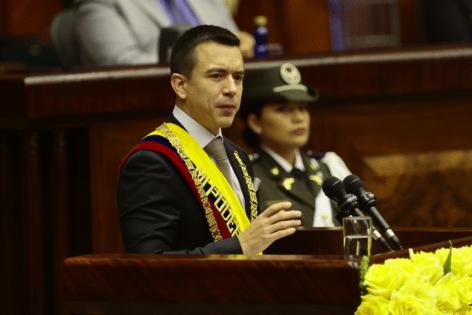Ecuador faces high-stakes presidential runoff between incumbent, leftist challenger
Published in News & Features
As Ecuador approaches a decisive presidential runoff election on April 13, the race between incumbent President Daniel Noboa and leftist candidate Luisa González is locked in a virtual dead heat. The election encapsulates a nation at a crossroads, with voters deeply divided over security concerns, economic instability and political governance.
A central figure looming over the contest is former President Rafael Correa, head of González’s political party, the Citizen Revolution Movement. Critics warn that a González victory could signal Correa’s continued influence over Ecuadorian politics, with concerns he may exert control behind the scenes.
Beyond party allegiances, the election underscores a profound ideological divide within Ecuadorian society. Right-leaning voters have coalesced around the Miami-born, Harvard-educated Noboa, while left-leaning supporters favor González and her promise of social and economic reform.
“In recent years, Ecuador has experienced deep political polarization, which has only intensified as we approach the election,” said political analyst Javier Guarnizo from Quito. “This divide affects every aspect of national discourse, even as Ecuadorians seek solutions to pressing challenges like education, healthcare and national security.”
With the nation facing rising crime rates and economic instability, the election is more than just a political battle — it’s a referendum on Ecuador’s future. Noboa’s tough-on-crime policies and commitment to economic stability will be weighed against González’s pledge for economic reform. Latest election polls show a statistical tie, meaning undecided voters hold the key to Ecuador’s future.
The 2025 presidential election marks a rematch following a fiercely contested first round in February. While Noboa ended up ahead, recent election surveys now place González slightly ahead, with 51% of voter support compared to Noboa’s 49%.
A crucial turning point came with the endorsement of third-place candidate Leonidas Iza, whose 538,000 supporters could sway the election in González’s favor. With only days left before the election, both campaigns are intensifying their outreach to swing voters.
Over 13.7 million Ecuadorians are registered to vote and must decide between re-electing Noboa for a full term, 2025-29, or return to so-called Correísmo, which would make González Ecuador’s first female president.
The key election issue
Ecuadorians head to the polls against a backdrop of escalating gang violence, largely driven by drug trafficking and organized crime. National security remains the nation’s foremost concern, with the crisis worsening despite Noboa’s aggressive measures.
In early 2024, Noboa declared an “internal armed conflict” against criminal organizations, deploying the Ecuadorian military and proposing high-security prisons modeled after El Salvador’s approach to crime. Despite the efforts, January 2025 became the most violent month in Ecuador’s history.
González also advocates a hardline stance on crime but criticizes Noboa’s reliance on foreign military contractors. Instead, she proposes strengthening Ecuador’s security forces and addressing crime’s root causes through social programs targeting poverty and unemployment.
Stability vs. reform
Ecuador’s struggling economy is another key battleground. Noboa’s administration secured a $4 billion loan from the International Monetary Fund, implementing tax hikes and subsidy reductions to stabilize public finances—moves that, while aimed at long-term economic stability, have strained his approval ratings.
González, aligning with Correa’s economic policies, vows to renegotiate the IMF deal, lower taxes and expand social welfare programs. Her critics argue this could jeopardize Ecuador’s financial standing, while her supporters see it as a necessary shift toward economic recovery.
Regardless of who wins, governance challenges loom large. Ecuador’s fractured National Assembly lacks a clear majority, with González’s Citizen Revolution Party holding 67 seats and Noboa’s National Democratic Action Party controlling 66 seats of the 151-member legislature. Both will need to negotiate with smaller political factions, making coalition-building crucial for passing legislation.
Contrasting global strategies
On the international stage, Noboa has taken a pragmatic but bold approach, exemplified by his controversial decision to send police into Mexico’s embassy to arrest a fugitive politician, straining Ecuador-Mexico relations.
González, aligned with Latin America’s leftist bloc, has pledged to restore ties with Mexico and strengthen relationships with progressive leaders like Brazil’s Lula da Silva and Colombia’s Gustavo Petro. Critics warn this could mean a return to Correa’s foreign policies, rekindling alliances with socialist-leaning governments.
Former Colombian Vice President Francisco Santos, speaking at a Miami forum hosted by the Interamerican Institute for Democracy, voiced concerns that a González victory would effectively return Correa to power.
“Let’s not deceive ourselves—Correa will be the one governing. She is merely a puppet,” Santos asserted. Institute Executive Director Carlos Sánchez Berzaín echoed this sentiment, warning that Ecuador could rejoin the “Socialism of the 21st Century” movement, originally championed by Venezuela’s Hugo Chávez.
The defining issue
Despite political and economic debates, the overwhelming concern for Ecuadorians remains security. The country has witnessed a dramatic surge in gang violence, particularly in cities like Guayaquil, Esmeraldas and Quito. Drug trafficking disputes, prison riots and organized crime have led to widespread chaos.
Authorities have struggled to contain the escalating violence, with frequent attacks on police officers, government buildings and civilians. Rival gangs, many with ties to international drug cartels, have turned Ecuador into a key transit hub for cocaine shipments bound for the U.S. and Europe.
In response, Noboa declared a state of emergency, deploying the military and enforcing curfews in high-risk areas. His administration has also classified major criminal organizations as terrorist groups, granting security forces expanded authority to combat them. However, the measures have yet to yield tangible results, with kidnappings, bombings and targeted assassinations continuing to destabilize the country.
The crisis has severely affected Ecuador’s economy, tourism and foreign investment, making security the defining issue of this election.
As Ecuadorians cast their votes, they must decide whether Noboa’s hardline approach or González’s broader social strategy offers the best path forward.
©2025 Miami Herald. Visit at miamiherald.com. Distributed by Tribune Content Agency, LLC.







Comments